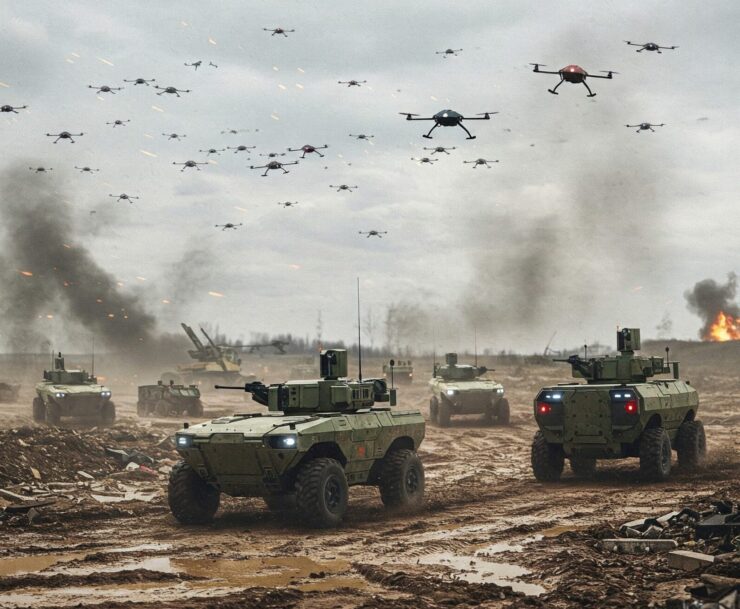The shift raises questions about America’s global tech competitiveness.
By Daria Solovieva
As Washington flip-flops and adds conditions to its support for Ukraine, the consequences of this geopolitical pivot are already reverberating far beyond the battlefield—threatening to undermine the U.S.’s global competitiveness in defense technology and innovation.
At the start of the month, the Trump administration said it is halting military aid to Kyiv, citing the need to ensure that U.S. assistance contributes to a resolution of the conflict.
As America pivots away from Ukraine, Ukrainian startups are increasingly turning to Europe for investment and clients, risking the U.S. falling behind in adopting the latest technological advancements and innovations.
“What we are seeing actually within Ukraine is a really renewed and vigorous increased interest from LPs [limited partners] and VCs across Europe,” says Deborah Fairlamb, a Kyiv-based partner at Green Flag Ventures, a US venture firm focused on Ukrainian defense tech startups. “There is a recognition that what is happening in Ukraine is not just pertinent to Ukraine’s defense right now, but can absolutely be applied to European defense as well.”
A New Kind of War
The shift comes at a critical juncture for Ukraine’s startup ecosystem, which has become ground zero for cutting-edge defense technologies and wartime innovation.
Fairlamb and other investors who’ve been involved on the ground in Ukraine note the significance of technology in the conflict in Ukraine, from the speed of iteration and application in real life on the front lines to an emergence of a new generation of battlefield experts with the skill set to operate new tools–a completely different type of warfare from any major conflict we’ve seen before.
“Warfare has changed, and quite frankly, right now the Russians and the Ukrainians both probably have the best battlefield, the best technological experience about how these new wars are going to be fought going forward,” she said. “Ukraine is an extremely important partner in understanding how future battles are going to be fought, and how you prepare for them.”
The Europeans are wasting no time in acknowledging this reality and taking action.
The white paper by the European Commission earlier this month on European defense readiness notes “the future of Ukraine is fundamental to the future of Europe as a whole,” calling for a “massive increase in European defense spending… to credibly deter armed aggression and secure our own future.”
The EU has already launched initiatives like the €50 billion Ukraine Facility to support startups and small businesses, with specific allocations for war-affected regions.
In the past month alone, Europe has pledged billions toward defense technology, including $165 billion (€150 billion) through the ReArm Europe Initiative and €50 billion via the Ukraine Facility. These investments are focused on cutting-edge technologies including AI, autonomous systems and cybersecurity to modernize Europe’s defense capabilities.
Ukrainian Startups Turn to Europe
Since Russia’s full-scale invasion in 2022, Ukrainian firms have pivoted countless times, developing solutions ranging from drone swarms capable of overtaking enemy defenses to AI-powered systems that optimize artillery strikes with pinpoint accuracy.
These innovations are not only reshaping Ukraine’s military strategy, but also attracting global attention from defense contractors and venture capitalists.
Meanwhile, Washington’s hesitance is creating uncertainty among Ukrainian startups that rely on international partnerships to scale their operations.
“We’re seeing European investors move quickly to fill the gap,” says Anton Verkhovodov, partner at Ukrainian VC firm D3, according to a recent New York Times article. “They understand that Ukraine is not just a recipient of aid—it’s a producer of solutions that will shape the future of security.”
Unlike the new American administration, which views the war in Ukraine as a distant conflict, the Europeans perceive it as an immediate and pressing reality. For many Ukrainian startups, as opportunities in the U.S. diminish or become more challenging, Europe emerges as a promising destination, offering better prospects for growth and collaboration.
Among their portfolio companies, Fairlamb says there is “an understanding that they will be looking to see where the markets are,” whether that’s Europe, Southeast Asia or elsewhere.
“In the United States, it tends to be a little bit more closed right now, whereas, if you are looking sort of across Europe, you have got the, you know, 27 member states that you can potentially sell into, “ she notes.
Her U.S.-based partner Justin Zeefe, who compares Ukraine’s startup potential to Israel’s, agrees that the political shake-up and Europe’s
“Europe will step up its investment into the sector, and because at the end of the day, it is much less expensive to allocate $500 billion to send to Ukraine than it is to fight the Russians in Poland or on the Polish border, right?” he says.






Add comment